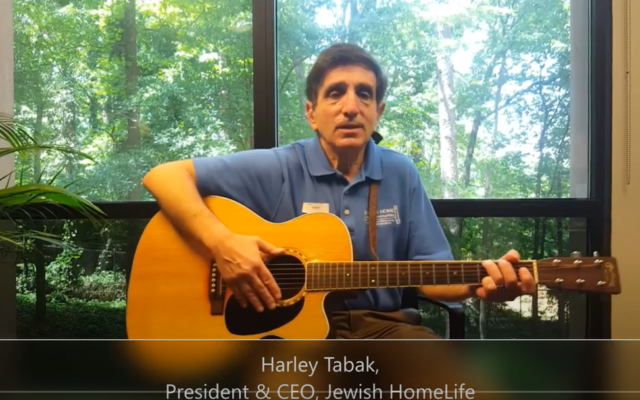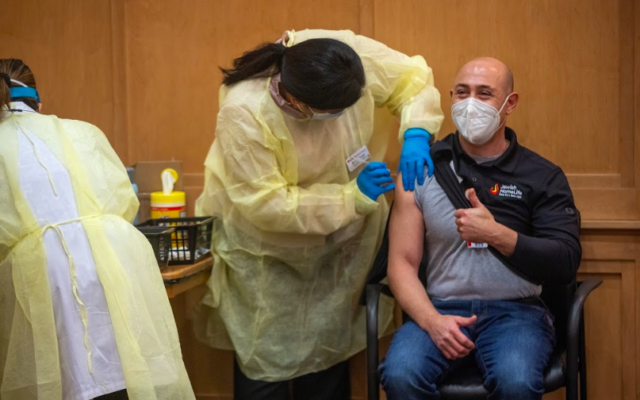Tabak Announces Retirement from Jewish HomeLife
Harley Tabak intended to be a doctor or rabbi, but found a combination that he believes is “sacred work.”
Dave Schechter is a veteran journalist whose career includes writing and producing reports from Israel and elsewhere in the Middle East.

Jewish HomeLife announced on Jan. 10 that Harley Tabak, its president and CEO, will retire at the end of this year.
Tabak, who has led JHL since December 2004, will be succeeded in April by Jeff Gopen, currently the chief operating officer. Tabak, 67, will remain as CEO Emeritus, working on such projects as renovations at the Jewish Tower and Zaban Tower, which are expected to begin in the spring.
Jeff Berman, chair of JHL’s board, said in a statement: “Harley’s leadership has been instrumental in making Jewish HomeLife one of Metro Atlanta’s leading senior care providers. Jewish HomeLife will go from strength to strength — from Harley’s two decades of leadership to Jeffrey Gopen, who was recruited to Jewish HomeLife in a national search as part of our long-term succession planning more than five years ago.”
Beginning in 1951 with The William Breman Jewish Home, Jewish HomeLife has grown to include the Aviv Rehabilitation Center, Berman Commons, The Cohen Home, The Zaban Tower, The Jewish Tower, The One Group, JHL Medical Services and Weinstein Hospice.
Following his graduation from George Washington University with a master’s degree in long-term health administration, Tabak entered the field in 1979, as administrator of a nursing home in Manassas, Va.
Where four decades ago the industry was primarily nursing homes, “The biggest change is that there are so many more options available to older adults as they age, which I think is a good thing,” he told the AJT.
Without question, the COVID-19 pandemic made the past two years “the most challenging of my career,” Tabak said, adding, “That first year especially was a nightmare.”
There were COVID outbreaks, affecting both staff and residents, at the Berman Commons assisted living residence in March 2020 and at the Breman Home skilled nursing facility in October 2020.

“There hasn’t been a pandemic in over 100 years. None of us have gone through this before,” Tabak said. “When it started, it felt like I was fighting a war without weapons, literally. My number one priority was how do I protect my staff from getting infected and my residents from getting infected.”
Those weapons included personal protective equipment, which was difficult to find and expensive to obtain. Jewish HomeLife was fortunate that a resident’s son was an executive of a medical supply company in China and was able to secure the necessary items. “I was literally on the phone in the middle of the night with a guy in China,” Tabak said.
JHL began vaccinating staff and residents in December 2020.
In a 2021 Rosh Hashanah message published in the AJT, Tabak said: “The day we had our first vaccine clinic at Jewish HomeLife was one I will never forget. The hope emanating from our staff and residents was palpable. Watching our staff applaud and cheer as each of their colleagues was immunized … Seeing the residents from the Jewish and Zaban Towers waiting hours in line for a chance at normalcy … Going floor to floor with the pharmacists and nurses at the William Breman Jewish Home to vaccinate the remaining residents, knowing that had this vaccine been available months earlier others might have lived.”
Tabak told the AJT that, along the way, “We’ve done some smart things,” one of which was to mandate that all staff be vaccinated.
“The challenge of recruiting staff continues,” he said. “COVID has made it even more of a challenge because people now have a much greater appreciation for the work that we do in our field, but employees understandably recognize that they put themselves in a greater risk.”
Tabak has been known as the “singing CEO” because of the traditional Jewish songs and American folk classics that he performs for residents of JHL’s facilities — examples of which can be found on YouTube — a practice throughout his career.
Noting that for 20 years he also was the volunteer cantor at Congregation Ner Shalom in Woodbridge, Va., where his family were members, Tabak joked that he is popular “with non-paying audiences.”
In a 2015 interview with Gracie Bond Staples of the Atlanta Journal-Constitution, Tabak likened himself to the “scene in ‘Animal House’ in which John Belushi takes the guitar from the man singing to women on the stairwell and smashes it. I’m the guy singing that music.”
Staples wrote: “Although he’s never fancied himself a professional singer, Harley Tabak has been singing for nearly his entire life, beginning at age 7 in his temple choir and continuing, as a way to attract women, in high school and college … The night he met his wife, Terri, he sang ‘If I Were a Carpenter’ for her. She was smitten. He was, too, and that very night he asked her to marry him. Terri said yes.”
Married in 1976, the couple has a son in Honolulu who is a pediatric surgeon and military officer (and, with his wife, is the father of the Tabaks’ two grandchildren) and a daughter who is an actor in New York City.
In retirement, “Aside from spending more time with my beautiful wife, who remarkably says that she enjoys being with me,” Tabak is looking forward to spending more time outdoors, particularly hiking.
Growing up, he intended to be either a doctor or a rabbi. “I ended up doing what in my mind is somewhat of a combination of both. The care of older people is sacred work. I really believe that. I have been doing something that’s very meaningful to the Jewish tradition. I consider it Tikkun Olam, the healing of the world. There’s a lot of broken minds and bodies that need healing and that’s what I consider my profession to be,” Tabak said, “It’s been a privilege.”
- Dave Schechter
- News
- Local
- Jewish HomeLife
- Harley Tabak
- Jeff Gopen
- Jewish Tower
- Zaban Tower
- Jeff Berman
- senior care providers
- William Breman Jewish Home
- Aviv Rehabilitation Center
- Berman Commons
- Cohen Home
- One Group
- JHL Medical Services
- Weinstein Hospice
- Berman Home
- George Washington University
- Nursing Homes
- Atlanta
- COVID-19 pandemic
- COVID outbreaks
- COVID
- pandemic
- Staff
- Personal Protective Equipment
- vaccinating
- vaccine clinic
- Residents
- Congregation Ner Shalom
- Cantor
- Gracie Bond Staples
- John Belushi



comments